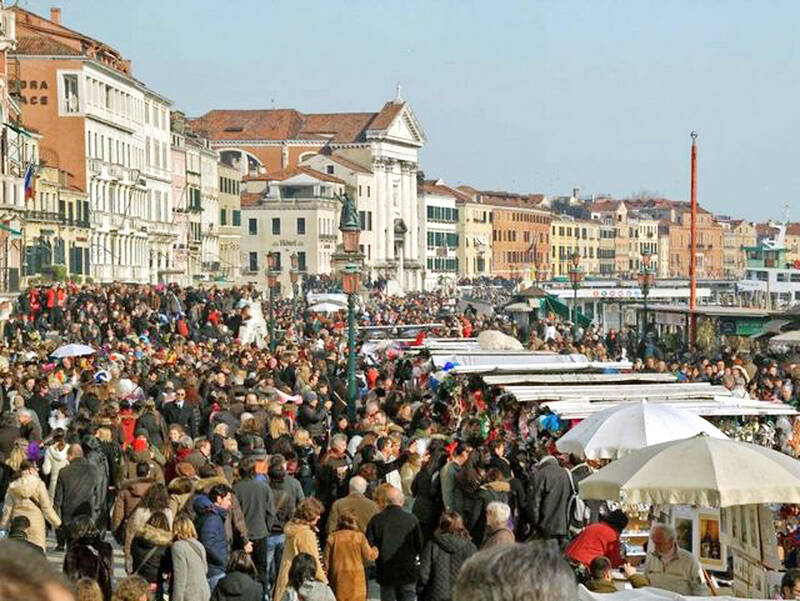As global travel rebounds following the COVID-19 pa ndemic, the longstanding issue of overtourism has returned stronger than ever. Throughout 2024, numerous popular destinations worldwide struggled with tourist numbers that far exceeded their infrastructural and environmental capacities. Not only does this surge congest streets and pollute landscapes, but it also endangers cultural sites and disrupts the daily lives of residents.
In response to the growing problem of “overtourism,” various nations have adopted diverse strategies, some of which have sparked controversy. Venice, Italy, has not hesitated to take bold action; since 2024, the city has implemented one of the most discussed regulations — charging visitors up to €5 (about NT$173) for single-day visits. This policy aims to reduce visitor numbers and preserve historic sites, though critics argue the fee is too low to effectively deter tourists and only addresses superficial problems. Similarly, Japan’s tourist destinations are contemplating increased visitor or accommodation taxes to support infrastructure and waste management, along with a proposed threefold hike in entrance fees for international visitors at some heritage sites.
Rather than implementing strict measures, some destinations have embraced creative solutions. For example, in the summer of 2024, Copenhagen, Denmark, piloted the CopenPay program, with 24 attractions participating in the one-month scheme to promote sustainable visitor behavior. Tourists could earn rewards, such as free beverages and museum tickets, by engaging in eco-friendly actions, like cleaning up litter from canals or using public transportation. The initiative strives to transform tourism from an environmental burden into a source of positive change.

Photo: Wikimedia Commons / 照片:維基共享資源提供
Addressing overtourism remains a global challenge, and it’s crucial to acknowledge that no one-size-fits-all solution can address its complexities. Whether through regulatory measures or innovative incentives, successful strategies must effectively balance the needs of local communities, economic growth and environmental protection.
隨著全球旅遊在 COVID-19 大流行後逐漸恢復,長期存在的過度旅遊問題又變得比以往任何時候都更加嚴重。在西元 2024 年期間,全球眾多熱門目的地都在對抗遠超過其基礎設施和環境承受能力的遊客數量。這股遊客潮不僅堵塞了街道並污染了景觀,還危及文化遺址並干擾居民的日常生活。
為了應對日益嚴重的「過度旅遊」問題,各國採取了多樣化的策略,其中一些引發了爭議。義大利的威尼斯毫不猶豫地採取了大膽行動;自西元2024 年起,該市實施了一項最受討論的規定——對單日遊的旅客收取最高 5 歐元(約新臺幣 173 元)的費用。這項政策旨在減少遊客數量並保護歷史遺跡,但批評者認為收費太低,無法有效遏制遊客,且只解決表面問題。同樣地,日本的旅遊景點正在考慮增加遊客稅或住宿稅,以支持基礎設施和廢棄物管理,並提議將一些文化遺址的國際遊客門票價格提高三倍。
有些目的地沒有實施嚴格的措施,而是採取了創新的解決方案。例如,在西元 2024 年夏季,丹麥的哥本哈根試行了 CopenPay 計畫,有 24 個景點參與了為期一個月的方案,來促進可永續發展的遊客行為。遊客可以透過參與清理運河中的垃圾或使用公共交通等環保行動來獲得獎勵,例如免費飲料和博物館門票。這項倡議致力於將旅遊業從環境負擔轉變為正面變革的推動力。
解決過度旅遊仍然是一項全球性挑戰,承認沒有一個萬全之策能夠處理其複雜性至關重要。無論是透過監管措施還是創新的激勵措施,成功的策略都必須有效平衡當地社區、經濟發展和環境保護的需求。
MORE INFORMATION
overtourism n. 過度旅遊
pandemic n. 疫情大流行
longstanding adj. 長期存在的;由來已久的
infrastructural adj. 基礎建設的
congest v. 擠滿;擁塞
threefold adj. 三倍的
Copenhagen n. 哥本哈根(丹麥首都)
one-size-fits-all adj. 通用的
KEY VOCABULARY
1. rebound v. 重新振作;反彈
Michelle rebounded quickly from her failure and started working on a new project.
蜜雪兒從失敗中迅速振作並開始投入一個新專案。
2. disrupt vt. 擾亂;顛覆
The sudden power failure disrupted the production process at the factory.
突如其來的停電擾亂了工廠的生產過程。
3. controversy n. 爭議;爭論
This company has been caught up in controversy ever since toxic chemicals were found in its products.
自從被發現產品含有有毒化學物後,這間公司陷入爭議。
4. deter vt. 阻止;使打消念頭(三態 deter-deterred-deterred)
We put up a sign that said “Beware of dog” to deter any attempted theft.
我們放了一張上面寫著「當心有狗」的告示來阻止任何竊盜企圖。
5. superficial adj. 表面的;膚淺的
Jenna’s understanding of the topic was superficial, as she had only skimmed the article.
珍娜對這個主題的理解很表面,因為她只是略讀了這篇文章。
6. scheme n. 方案;計畫
The architect’s design scheme for the house is to build and decorate it in a Spanish style.
該建築師對這棟房子的設計方案是以西班牙風格來建造和裝潢它。
7. beverage n. 飲料
The most well-known beverage in Taiwan has to be bubble milk tea.
臺灣最知名的飲料一定是珍珠奶茶了。
8. complexity n. 複雜性
Paul spent weeks trying to learn the complexities of computer code, but found it too difficult to understand.
保羅花了數週的時間試圖學習電腦程式碼的複雜性,但發現它太難理解了。
9. incentive n. 動機;激勵;誘因
I hope that the new system of bonuses will be an incentive to the workers.
我希望新的獎金制度對員工來說是個激勵。
學習音檔: https://magazine.english4u.net/Magdata/menu/09nve
《空中美語》雜誌APP免費下載: https://www.english4u.net/apps/index.aspx
免費收聽當月《空中美語》雜誌課文朗讀及解析 !
文章由AMC空中美語授權使用: https://www.english4u.net

A: Brazilian jiu-jitsu, known as “BJJ,” has become more and more popular. Even Hollywood stars like Halle Berry and Tom Hardy are obsessed with it. B: Some Asian stars, such as Taiwanese actor Eddie Peng and South Korean actor Lee Joon-gi, have also practiced this martial art. A: BJJ is not just a martial art, but also a combat sport. B: I’ve always wanted to try it, but I’m worried about getting injured. A: Diana Wang, a US doctor of physical therapy, is holding a BJJ seminar at PMA Brazilian Jiu-jitsu in Taipei Friday night. Let’s go check out how we

Picture a 45-foot-long animal with a 5-foot-long skull and 3-foot-long arms. It may not seem strange until you realize that a human with those proportions would be 6 feet tall with 5-inch arms. Although the Tyrannosaurus rex went extinct 65 million years ago, the mystery of its unusual body __1__ has fascinated scientists for over a century. Barnum Brown, the paleontologist who first discovered T. rex fossils, initially found it hard to believe that the tiny arms belonged to such a __2__ creature. One of his colleagues speculated that the short forelimbs might have been used to hold the

A: Actually, Brazilian jiu-jitsu is particularly good for small people like you. B: Really? How so? A: According to Diana Wang, a US doctor of physical therapy, the BJJ’s purpose is to help smaller, weaker people defend themselves by using various techniques, such as leverage. B: That sounds interesting. What time does Dr Wang’s BJJ seminar begin tonight? A: The event is scheduled for 7:30pm at PMA Brazilian Jiu-jitsu in Taipei. Admission is free, but donations are welcome. A: 其實你的個子比較小,很適合練巴西柔術呢。 B: 真的嗎?為什麼? A: 據美國理療醫師王幼瑞博士說,巴西柔術的概念是讓弱小的人,也能利用槓桿作用等技巧防身。 B: 真有趣,王醫師的巴柔研討會幾點開始? A: 今晚7點半在「台北巴柔運動館」,免費入場自由樂捐唷! (By Eddy Chang, Taipei Times/台北時報張迪)

Photographer Franziska Stuenkel likes to take spontaneous urban shots, so she needs a nimble camera that is ready to go when inspiration strikes: her German-made Leica M11. “I have to be very quick and discreet,” said the Berlin-based artist who captures reflections of people walking past windows, their contours merging with the shapes behind the glass. Stuenkel’s compact Leica is the perfect camera for the job, the 51-year-old told AFP. Famous for its pocket-sized and retro-style devices, the Leica brand is celebrating a milestone as it marks 100 years since its first commercial camera was presented to the public. The